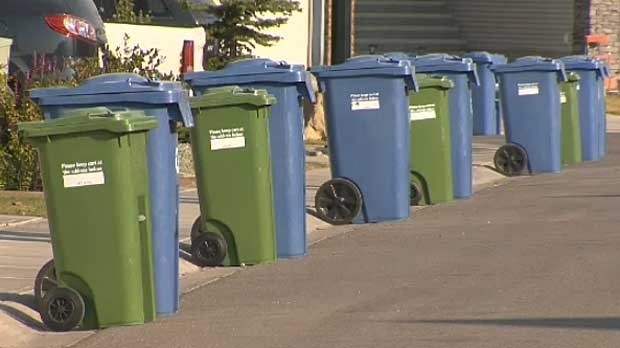THUNDER BAY – The City of Thunder Bay’s plan for a green bin composting program includes reducing the frequency of garbage collection to every other week starting in 2025, city council heard on Monday.
With weekly green bin pickup, that won’t be a problem, staff said, given that food and other organics make up about half of what residents throw in the trash.
Council heard a first report Monday ahead of a June 27 vote to approve the plan, a blueprint drawn up by administration to meet a provincial policy mandating the city to divert half its residential organic waste from landfill by 2025.
The plan would implement weekly green bin collection for single-family homes by 2025, and for apartments and other multi-unit buildings by 2026 (the city would then evaluate adding businesses).
As well as cutting garbage collection to every other week, the city would double yard waste pickup to four times per year.
It would also introduce an auto-cart system for pickup of both compost and garbage, using standardized bins and automated “lift assist” arms expected to bring efficiencies and reduce physical strain on staff.
The city likely can’t meet the province’s 50 per cent diversion target without taking those steps, staff said in a report.
City manager Norm Gale called the proposed changes a “big deal” that will bring substantial benefits.
“These recommended changes will transform the way we manage solid waste in our community,” he said. “They will improve service levels, increasing waste reduction opportunities for residents, reducing litter, improving the health and safety of the people who work here, and creating operational savings.”
The program is projected to boost the city’s residential waste diversion rate from 25 to 42 per cent, and cut carbon emissions by the equivalent of 5,380 tons of CO2 a year – about 5.7 per cent of Thunder Bay's waste-related GHG emissions, or about 0.4 per cent of the city's total emissions.
The changes will bring new costs as well, amounting to an average of $1.5 million per year, or a $33 impact to municipal property taxes for the average household.
However, staff project the city can make up over $800,000 of that through efficiencies from implementation of the auto-cart trucks, which require just one employee to operate instead of two.
A report from the city indicated a cut of 5.3 FTEs in the waste collection department is possible under the plan.
It's also supposed to reduce the physical demands of the job on waste collection workers, with administration suggesting that could reduce injuries and WSIB spending of around $200,000 a year in the department.
Some councillors questioned how residents would respond to less frequent garbage collection.
Even with weekly collection, said Coun. Brian Hamilton, some neighbourhoods still see trash building up.
“In my ward, and I think right around the city, there are people who miss garbage days, there’s garbage that accumulates in the lane-ways,” he said. “I’m really hoping we can factor that in.”
Staff pointed to the experience of other communities in Ontario to argue the reduction would incentivize residents to take full advantage of the green bin program – a nudge necessary to hit the provincial target.
Cities that implement weekly garbage and green bin service typically capture around 80 to 140 kilograms of organic waste per household, compared to 110 to 340 kilograms for communities that cut garbage collection to biweekly.
Sudbury saw an immediate 16 per cent jump in green bin participation after making garbage collection biweekly last year, staff reported.
Coun. Rebecca Johnson speculated some residents could struggle with the transition to less frequent, though she personally welcomed it.
“I believe you don’t need to pick up garbage [more than] every two weeks,” she said. “We shouldn’t even have any garbage, to be quite honest with you. Recycle and do organics, you shouldn’t hardly have any garbage at all.”
A waste study conducted for the city in 2018 and 2019 found food waste made up 43 per cent of curbside residential collected garbage, while yard waste made up another 7 per cent or so.
The city collects waste from an estimated 37,000 single-family households, 9,100 multi-family units located in 439 buildings, just under 1,000 small businesses, and a number of municipal facilities and public spaces.
Council will vote on the proposed green bin plan on June 27.
If passed, the city would then release a Request for Proposal for an aerobic organics processing solution, reporting back to council by December with a recommendation.
The city examined the possibility of an anaerobic digester at the Mapleward landfill, but determined it would not be a cost-effective solution.
Administration will present a detailed implementation plan, including program costs and design parameters, by January 2023.
